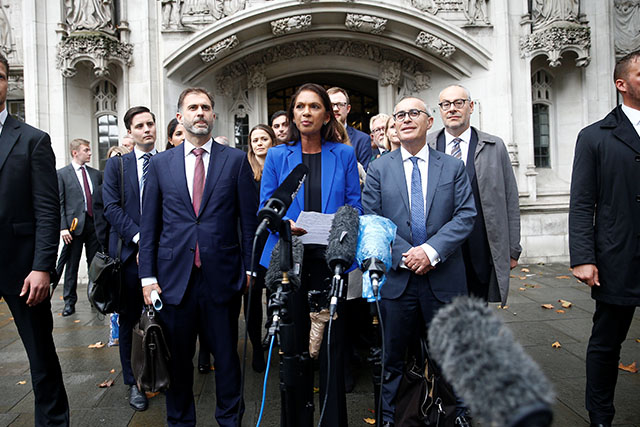
LONDON — Scotland’s highest court said it would wait before deciding whether to take action to force Prime Minister Boris Johnson to ask for a Brexit delay if he has failed to secure a divorce deal with the European Union by Oct. 19.
Johnson has repeatedly said he would not seek any extension and Britain would leave as scheduled on Oct. 31, “do or die,” despite legislation which compels him to ask for a delay if he fails to reach a deal.
He has not explained how he would achieve a no-deal divorce by the end of the month while also promising not to break the law. Opponents fear he has found a loophole, though others think he is bluffing.
With politicians deadlocked, the issue of whether Britain delays Brexit could now be one for judges to decide.
The Benn Act
On Sept. 4, parliament voted through legislation to prevent Johnson from taking Britain out of the EU without a deal. The law was backed by an alliance of rebels in Johnson’s Conservative Party and opposition lawmakers.
Called the Benn Act after the lawmaker who proposed it, the law says Johnson must write to the EU to request a three-month Brexit extension until Jan. 31, 2020 if he has not managed to agree on a divorce deal by Oct. 19 and parliament has not given its approval to leave without agreement.
If the EU offers a delay or a different length of extension, the law says he must accept. It even includes a text of the letter Johnson must send.
Despite the legislation, which Johnson has dubbed “the surrender act”, he has repeatedly said Britain would still leave the bloc on Oct. 31 as planned, and he would rather be “dead in a ditch” than ask for any delay.
Such comments have provoked a number of pre-emptive court challenges from opponents who argue that Johnson must be prevented from breaking the law.
Can Johnson get round law?
Former attorney general Dominic Grieve, who has been kicked out of the Conservative Party over his backing for the Benn Act, says he is confident that the law is legally watertight and that Johnson cannot avoid asking for an extension.
However, government ministers have said the law has a number of deficiencies and only imposes “narrow duties,” suggesting Johnson could somehow get around it without having to break it. Such legal escape routes have not been spelled out.
One idea mooted has been that the government could declare a national emergency, allowing it to circumvent the law.
Former Prime Minister John Major also suggested that government ministers could use something called an “order in council” which would allow them to suspend the Benn Act using royal powers without requiring the assent of parliament or Queen Elizabeth II.
However, the government has said it does not recognize such a plan.

On Tuesday, an unidentified official in Johnson’s office, which some lawmakers say could be his senior adviser Dominic Cummings, told the Spectator magazine that the government could “do all sorts of things to scupper delay.”
The official said Britain would withhold cooperation with EU countries which supported a delay, including on security and defense issues, and that the government would make clear any extension would be pointless as it would refuse to engage in any further talks.
The Scottish case
In order to ensure that Johnson does abide by the Benn Act, a legal challenge was launched in Scotland by anti-Brexit campaigners, fronted by tax lawyer Jo Maugham and Scottish National Party lawmaker Joanna Cherry who have led previous successful Brexit-related court cases.
They asked Edinburgh’s Outer House of the Court of Session to issue an order compelling Johnson to comply with the law or risk penalties including a fine or imprisonment.
During the hearings, Johnson’s government promised to abide by the law. Judge Paul Cullen, known as Lord Pentland, ruled that these promises meant the court did not have to take action to compel Johnson to do so — at least not yet. But he also said it would be a serious matter if Johnson were to renege on those promises.
“I approach matters on the basis that it would be destructive of one of the core principles of constitutional propriety and of the mutual trust that is the bedrock of the relationship between the court and the crown for the prime minister or the government to renege on what they have assured the court that the prime minister intends to do,” he said.
The campaigners also asked Scotland’s highest court, the Court of Session’s Inner House, to say it would send a letter on Johnson’s behalf to the EU to ask for the extension if he refused to do so, using a power known as “nobile officium.”
In its ruling on Wednesday, the court said normally the challenge would be rejected and said judges should only interfere if there was “demonstrable unlawfulness”.
“Until the time for sending the letter has arrived, the PM has not acted unlawfully, whatever he and his officials are reported to have said privately or in public,” the court’s three judges said.
But, because of the time pressure to take action if Johnson does not comply with the law, it said it would hold off making a decision until Oct. 21, a move which campaigners said left a judicial “Sword of Damocles” hanging over the prime minister.
Other legal cases
Other legal cases are also planned to force Johnson to abide by the Benn Act.
The Independent Workers’ Union of Great Britain (IWGB), which represents low paid workers, said on Tuesday it had filed papers at London’s High Court seeking an injunction to prevent Johnson undermining the law.
Human rights group Liberty said it would also start a case to force Johnson’s compliance with the act, saying it was not about Brexit but the rule of law.
On the other side of the argument, Conservative lawmaker Daniel Kawczynski has said he is seeing whether he can launch a legal challenge to the Benn Act itself.
Previous cases
The challenges over the Benn Act are the latest cases that have seen major decisions over Brexit end up being decided by judges, with all major rulings going against the government.
In 2017, the Supreme Court, the highest judicial body in the United Kingdom, ruled that then-Prime Minister Theresa May could not officially notify the EU of Britain’s intention to leave without approval from parliament.
In December last year, a case at the European Court of Justice established that Britain could unilaterally revoke its decision to leave. Last month, Britain’s Supreme Court concluded that Johnson acted unlawfully in suspending parliament for five weeks in the run-up to Brexit.
The cases have led to charges from Brexit supporters that the judiciary is meddling in political matters which should not concern the courts, something the Court of Session indicated it was conscious of in its ruling on Wednesday.
“The political debate requires to be played out in the appropriate forum,” the judges said.
“The court may only interfere in that debate if there is demonstrable unlawfulness which it requires to address and to correct. At present, there has been no such unlawfulness.”
— Reporting by Michael Holden; Editing by Guy Faulconbridge and Peter Graff









